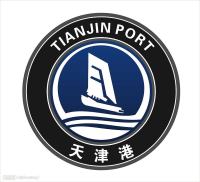Ankang is a name shared by a number of psychiatric hospitals or asylums in China. The term literally means "peace and health [for the mentally ill]". Many of these institutions are prison-hospitals for holding prisoners judged to be mentally ill, and operate directly under the local Public Security Bureau. As a result, "ankang" is sometimes used in the Western press to denote the system of prison-hospitals in China. However, not all ankang hospitals are prison-hospitals, and some offer conventional psychiatric and medical treatment services.

The Port of Tianjin, formerly known as the Port of Tanggu, is the largest port in Northern China and the main maritime gateway to Beijing. The name "Tianjin Xingang", which strictly speaking refers only to the main seaport area, is sometimes used to refer to the whole port. The port is on the western shore of the Bohai Bay, centred on the estuary of the Haihe River, 170 km southeast of Beijing and 60 km east of Tianjin city. It is the largest man-made port in mainland China, and one of the largest in the world. It covers 121 square kilometers of land surface, with over 31.9 km of quay shoreline and 151 production berths at the end of 2010.

The Roman Catholic Diocese of Suzhou is a diocese located in Suzhou, Jiangsu, China, under the Ecclesiastical Province of Nanjing. It covers the entire city of Suzhou.
Wuyi University is a public university based in Jiangmen, Guangdong, China.
The China Zebrafish Resource Center (CZRC) is a non-profit organization located in 7 Donghu South Road, Wuhan, Focusing mainly on zebrafish resources. It was established in the Institute of Hydrobiology, Chinese Academy of Sciences, in October 2012, currently headed by the Board Chairman Meng Anming.

Tang Feifan was a Chinese medical microbiologist best known for culturing the Chlamydia trachomatis agent in the yolk sacs of eggs.

Wang Qianyuan is a Chinese actor who graduated from the Central Academy of Drama. He won Best Actor at the 23rd Tokyo International Film Festival for his role in the movie, The Piano in a Factory.
Liao Xiangzhong is a Chinese animation and digital art expert who has served as president of the Communication University of China (CUC) since March 2018. He was Vice President of CUC from November 2010 to March 2018. He is a PhD advisor and professor of Digital Media Art at CUC.
Meng Wei is a former Chinese politician and environmentalist who served as president of the Chinese Research Academy of Environmental Sciences from 2001 to 2016. As of November 2017 he was under investigation by the Communist Party's anti-corruption agency. He was an academician of the Chinese Academy of Engineering. He was a deputy to the 11th and 12th National People's Congress. He was the first notable figure implicated in corruption following the 19th National Congress of the Chinese Communist Party on October 24, 2017. He is the third academician of the Chinese Academy of Engineering whose title has been revoked in the past two years, after Li Ning and Zhou Guotai. Meng Wei has been stripped of his post and party membership on April 4, 2018.

The Tsunami Advisory Center of the Ministry of National Resources is a Chinese administrative agency that aims to mitigate tsunami damage in the coastal areas of China. The agency is also known as the UNESCO Intergovernmental Oceanic Committee South China Sea Regional Tsunami Warning Center, which is abbreviated as the South China Sea Tsunami Advisory Center (SCSTAC). It was founded in 2013 and is a subsidiary of the Ministry of Natural Resources of the People's Republic of China and the National Marine Environmental Forecasting Center.
The Shihezi Economic and Technological Development Zone is an economic and technical development zone at national level located in the eastern suburbs of Shihezi City, Xinjiang Uygur Autonomous Region, China. It is situated east to Hetan Road (河滩路), west to the Dongsi and Dongqi Roads (东七路), south to the Northern Xinjiang railway, north to G312 National Highway, the total planning area is 11.2 square kilometers.

China National Highway 338 will run from Haixing to Tianjun. It is one of the new trunk highways proposed in the China National Highway Network Planning.

Yinchuan railway station is the main railway station of Yinchuan, the capital of China's Ningxia province. The station was opened in 1958. In 1988, a new station building was inaugurated, which was replaced in 2011 by a building on the opposite (eastern) side of the platforms.

TMSR-LF1 is a 2 MWt molten salt reactor (MSR) pilot plant located in northwest China.
The Qing dynasty developed a complicated system of ranks and titles. Princess's consort was granted a title of efu, meaning "imperial charioter". However, the title was not granted to the spouses of clanswoman. An efu retained his title and privileges as long as the princess remained his primary spouse – even after her death. However, if an efu remarried or promoted another consort to be his primary spouse, he lost all rights obtained from his marriage to the princess.
Territorial spatial planning is the spatial planning system of the People's Republic of China which, according to its official definition, serves as the guide of the country's territory's development, the blueprint of sustainable development, as well as the fundamental basis of all kinds of development. Territorial spatial planning is an "all-in-one" planning encompassing former major function zone planning, land-use planning, urban and rural planning, as well as other different types of spatial planning.

Tan Tianwei is a Chinese professor and an elected member of Chinese Academy of Engineering. He is the president of Beijing University of Chemical Technology since 2012. He is known for his work on biochemical engineering technologies, including bio-based chemicals, bio-energy and bio-materials.

Petroleum Geology & Experiment(Chinese: 石油实验地质) is a bimonthly peer-reviewed open access scientific journal covering the survey, exploration, engineering, and production of petroleum resources. It was established in 1963 and is sponsored by the China Petrochemical Corporation Petroleum Exploration and Production Research Institute and the Petroleum Geology Professional Committee of the Geological Society of China. The editor-in-chief is Guo Xusheng.









